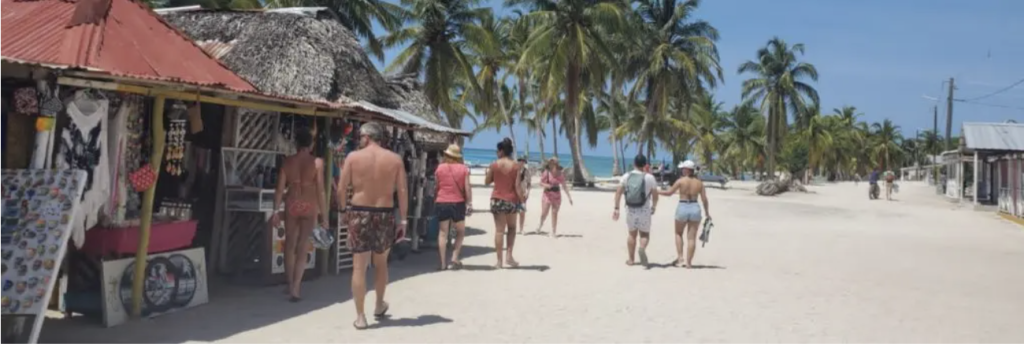
The media is now covering the gradual but consistent increase in lodging accommodations on Saona Island, the island where Pirates of the Caribbean scenes were filmed. Technically, overnight stays are not allowed, but they are happening. An increase in solar power service bodes for the trend to continue.
Last week, journalists were invited to participate in a Environmental Journalism Workshop, and two dozen journalists were taken by Ecored and the Punta Cana-Macao Energy Consortium to visit Saona Island.
Environmentalist Eleuterio Martinez told El Dia reporters that the law is clear and states that in a scientific reserve-protected area no infrastructures can be built. He said arts and crafts stands are authorized for the Mano Juan local community in Saona, but the law bans lodging facilities. Lodging is only legal in camping facilities.
The local inhabitants complain the hundreds of thousands of tourists that visit Saona Island’s paradisiacal beaches are not stopping by Mano Juan, the town, to buy arts and crafts. “This is not development; it’s a disaster,” concludes a native of Saona Island when describing the impact mass tourism has had on the country’s most visited beach destination in an interview with Hoy. Saona Island is part of Cotubanamá National Park (Parque del Este), a protected area receiving more than one million visitors annually. The tourists come on boat excursions, with most arriving from Bayahibe beach by boat.
The town now enjoys solar energy, the result of a first phase of 800 Kw in solar panels by the private company Compañía de Electricidad de Bayahibe (CEB), a subsidiary of Consorcio Energético Punta Cana-Macao (CEPM). The solar-powered energy service began in January 2023 and is serving energy 24 hours a day. The company now sells energy to the residents for RD$17 per kilowatt.
Hoy reports that there are already lodging operations offering stays for a variety of prices – from US$23 to upwards of US$434 at the Mindri Hotel that opened in 2021. The solar energy service will facilitate more of these operations.
Hoy reports work has started on the installation of a water desalinization plant.
Hoy reporters interviewed residents but these refused to go on record for the interview. The locals told Hoy that citizens from Chile, Italy, France, Spain are operating small hotels illegally and without permits. They complained about uncontrolled growth, calling these illegal despite operating in full view of government authorities.
There is an apparent increase in boat tour operators that take tourists to the island. The residents complain that very few stop by Mano Juan, the town where inhabitants depend on selling arts and crafts to tourists.
Inhabitants denounced that the ground has been perforated in a linear way and trenches have been opened with compressors in the earth in a coral soil that could affect the island.
The inhabitants are concerned more tourism development is coming in violation of the protected status of the island.
The village of Mano Juan was founded in 1944 during the dictatorship of Rafael Leónidas Trujillo by 12 families brought there to serve as sentinels of its resources. With decree 1311 of 16 September 1975, it was declared a protected zone and the inhabitants were told to make a living off tourism.
Agricultural and livestock activities were prohibited and the inhabitants were encouraged to work in handicrafts, fishing, and as tour guides, among other activities that did not impact the environment. In addition, the 12 families and their descendants were allowed to live, respecting their acquired rights, but no one else, and visitors had to leave the island by 4pm or have a permit from the Ministry of Environment to spend the night.
Concrete constructions, drilling, excavations, among others, are prohibited, according to Environment Law 64-00, Protected Areas Law 202-04, and National Parks Law 67-74. Any constructions need to be authorized by the Ministry of the Environment.
Saona has a population of around 260 people who have lived there for more than 15 or 20 years and the new migrants add up to 500 between workers and new residents.
Due to the lack of resources and activities to live, the descendants of the first 12 families that Trujillo brought to the island have moved to other areas of the country and have rented their houses to foreigners, or to small Dominican hotel investors who have turnd these properties into a short-term rental businesses. Some people have chosen to build a small annex in the backyard to live in and rent their houses to tourists.
Hoy interviewed Deputy Minister of Environment Federico Franco who said only two lodging operations are legal — one for the staff of the Turkish reality show Survive, and two houses in Mano Juan. In the interview he said that there is no problem with a person who lives there renting a room in his house to visitors.
Read more in Spanish:
Hoy
Hoy
El Dia
Diario Libre
14 March 2023

